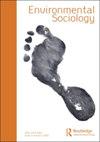有毒的自由:中产阶级季节性水果采摘者如何感知和管理农药暴露
IF 2.4
Q3 ENVIRONMENTAL STUDIES
引用次数: 0
摘要
摘要在一个比以往任何时候都更依赖化学物质的全球农业环境中,职业接触农药通常会导致根深蒂固的不平等。现有研究记录了主要面向低收入、种族化农场工人的农药暴露对健康的危害。然而,富裕国家的一些年轻中产阶级有意从事非正式的季节性农场工作。处于通常防止工作场所脆弱性的社会职位的员工如何管理有毒暴露的不确定性?这项研究借鉴了民族志观察和对加拿大不列颠哥伦比亚省讲法语、英语和西班牙语的国内外农场工人的深入采访。我确定了农场工人感知和管理农用化学品暴露的三种途径:非正式身体证据、单独管理风险和合理化暴露。这篇文章引入了“有毒自由”的概念,以展示工人如何通过将农药暴露视为个人自主、反文化理想主义和暂时的年轻冒险的合理权衡来淡化工作场所的风险。这项研究强调了为什么个人层面的农业健康和安全干预措施在保护工人免受有害农药接触方面可能受到限制。相反,它标志着政策干预的机会,如加强农药监管、积极的抽查、对违规行为的更高处罚,以及农场工人在工作场所拥有集体民主声音的更清晰渠道。本文章由计算机程序翻译,如有差异,请以英文原文为准。
Toxic freedom: how middle-class seasonal fruit pickers perceive and manage agrochemical exposures
ABSTRACT In a global agricultural context that is more chemically dependent than ever, occupational exposure to pesticides typically maps onto entrenched inequalities. Existing research has documented the health hazards of agrochemical exposure facing predominantly low-income, racialized farmworkers. Yet some young middle-class people in wealthy countries are intentionally pursuing informal seasonal farm jobs. How do workers in social positions that typically protect against workplace vulnerability manage the uncertainty of toxic exposures? This study draws on ethnographic observations and in-depth interviews with French, English and Spanish-speaking domestic and international farmworkers in British Columbia, Canada. I identify three pathways by which farmworkers perceive and manage agrochemical exposure: informal bodily evidence, individually managing risks and rationalizing exposure. This article introduces the concept of ‘toxic freedom’ to show how workers may downplay workplace risks by framing pesticide exposure as a reasonable trade-off for personal autonomy, countercultural idealism and temporary youthful adventure. This research underscores why individual-level agricultural health and safety interventions may be limited in protecting workers from harmful agrochemical exposures. Rather, it signals the opportunity for policy interventions such as stronger pesticide regulation, proactive spot inspections, higher penalties for non-compliance, and clearer channels for farmworkers to have a collective democratic voice in the workplace.
求助全文
通过发布文献求助,成功后即可免费获取论文全文。
去求助
来源期刊

Environmental Sociology
ENVIRONMENTAL STUDIES-
CiteScore
4.60
自引率
12.00%
发文量
34
期刊介绍:
Environmental Sociology is dedicated to applying and advancing the sociological imagination in relation to a wide variety of environmental challenges, controversies and issues, at every level from the global to local, from ‘world culture’ to diverse local perspectives. As an international, peer-reviewed scholarly journal, Environmental Sociology aims to stretch the conceptual and theoretical boundaries of both environmental and mainstream sociology, to highlight the relevance of sociological research for environmental policy and management, to disseminate the results of sociological research, and to engage in productive dialogue and debate with other disciplines in the social, natural and ecological sciences. Contributions may utilize a variety of theoretical orientations including, but not restricted to: critical theory, cultural sociology, ecofeminism, ecological modernization, environmental justice, organizational sociology, political ecology, political economy, post-colonial studies, risk theory, social psychology, science and technology studies, globalization, world-systems analysis, and so on. Cross- and transdisciplinary contributions are welcome where they demonstrate a novel attempt to understand social-ecological relationships in a manner that engages with the core concerns of sociology in social relationships, institutions, practices and processes. All methodological approaches in the environmental social sciences – qualitative, quantitative, integrative, spatial, policy analysis, etc. – are welcomed. Environmental Sociology welcomes high-quality submissions from scholars around the world.
 求助内容:
求助内容: 应助结果提醒方式:
应助结果提醒方式:


